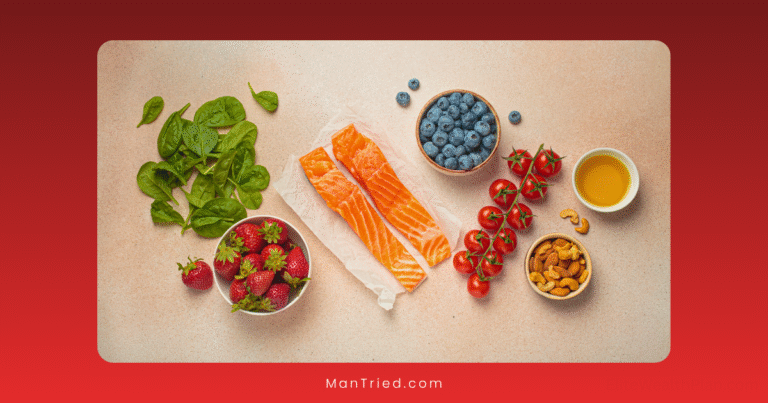Foods That Kill Libido: What to Remove From Your Diet Today

In a world where sexual wellness is increasingly recognized as an important component of overall health, understanding how your diet impacts your libido is essential. While many articles focus on foods that boost sexual desire, equally important is identifying the culprits that might be silently sabotaging your bedroom performance.
According to research, more than 15% of men experience low sex drive at some point in their lives, and diet plays a significant role in this issue. With erectile dysfunction projected to affect 322 million men worldwide by 2025, understanding dietary impacts on sexual health has never been more relevant.
This comprehensive guide examines the scientific evidence behind foods that can decrease libido and offers practical strategies for eliminating them from your diet without feeling deprived.
The Science Behind Food and Sexual Desire
Before diving into specific foods, it’s important to understand the mechanisms through which diet affects libido:
1. Hormonal Disruption
Many foods impact sex hormone levels, particularly testosterone and estrogen:
- Testosterone is crucial for sexual desire in both men and women. Foods that lower testosterone typically reduce libido.
- Estrogen dominance (when estrogen levels are disproportionately high compared to testosterone) can suppress sexual desire, particularly in men.
- Sex Hormone Binding Globulin (SHBG) binds to testosterone, making it unavailable for use. Some foods increase SHBG, effectively lowering free testosterone.
2. Blood Flow Restriction
Erectile function and clitoral engorgement depend on healthy blood flow:
- Foods that cause inflammation or arterial plaque can restrict blood flow to genital tissues.
- Nitric oxide production (essential for vasodilation) can be inhibited by certain dietary components.
3. Energy and Mood Effects
Sexual desire requires both physical energy and positive mood:
- Foods that cause energy crashes or disrupt blood sugar can reduce sexual interest.
- Dietary components that affect neurotransmitters like serotonin and dopamine can impact sexual motivation.
Top Libido-Killing Foods to Eliminate
Based on scientific research, these foods have the strongest evidence for negative impacts on sexual desire and function:
1. Alcohol
The Evidence: While a glass of wine might lower inhibitions initially, regular or excessive alcohol consumption is a proven libido killer.
- A study found that consuming 30-40 grams of alcohol daily (about 2-3 standard drinks) decreased testosterone levels in men by 6.8% over just three weeks.
- Chronic alcohol use increases aromatase activity, which converts testosterone to estrogen.
- For men, alcohol can cause erectile difficulties and delay ejaculation.
- For women, alcohol can reduce vaginal lubrication and make orgasm more difficult to achieve.
How Much Is Too Much: More than 1 drink daily for women or 2 for men consistently impacts sexual health.
Practical Substitution: Replace alcoholic beverages with antioxidant-rich alternatives like pomegranate juice, which may actually improve erectile function by supporting nitric oxide production.
2. Added Sugars and Refined Carbohydrates
The Evidence: That donut or soda might satisfy your sweet tooth while silently sabotaging your sex life.
- High sugar consumption requires insulin for absorption; consistently elevated insulin levels lower testosterone production.
- A 2018 study found that diets high in bread, pastries, and desserts were associated with low testosterone levels in men.
- Sugar consumption causes energy crashes that leave you too tired for intimacy.
- Refined carbs contribute to weight gain, which raises estrogen levels through increased aromatase activity in fat tissue.
How Much Is Too Much: The American Heart Association recommends no more than 36 grams (9 teaspoons) of added sugar daily for men and 25 grams (6 teaspoons) for women.
Practical Substitution: Satisfy sweet cravings with whole fruits, which contain fiber that slows sugar absorption, or dark chocolate (70%+ cacao), which contains flavanols that may actually improve blood flow.
3. Trans Fats and Highly Processed Oils
The Evidence: Though banned in many countries, trans fats still lurk in some processed foods and can devastate your sexual health.
- A study of 209 men found that those consuming the highest amounts of trans fats had 15% lower testosterone levels compared to those with the lowest intake.
- Vegetable oils high in omega-6 fatty acids (like soybean and corn oil) promote inflammation when consumed in excess, potentially restricting blood flow to genital tissues.
- Trans fats damage blood vessel function, impairing the vascular response necessary for arousal.
How Much Is Too Much: Any amount of artificial trans fats is too much; they provide no health benefits and only cause harm.
Practical Substitution: Replace processed oils with extra virgin olive oil, which contains compounds that support nitric oxide production and improve blood vessel health.
4. Soy Products (In Excess)
The Evidence: The relationship between soy and sexual health is complex and sometimes contradictory.
- Soy contains phytoestrogens (plant compounds similar to estrogen), which may affect hormone balance when consumed in large amounts.
- Some studies suggest consuming more than 120mg of soy daily can lower sperm count and testosterone.
- However, a 2021 meta-analysis concluded that neither soy nor phytoestrogens significantly affect testosterone levels in men.
How Much Is Too Much: Moderate consumption (1-2 servings daily) is likely fine for most people, but those with existing hormonal imbalances may be more sensitive.
Practical Substitution: If concerned, replace soy protein with other plant proteins like hemp, pea, or rice protein, which don’t contain phytoestrogens.
5. Mint (Especially Peppermint and Spearmint)
The Evidence: That breath-freshening mint might be cooling more than your mouth.
- Studies show that mint, particularly spearmint, can significantly reduce testosterone levels.
- In women with PCOS (who typically have elevated testosterone), mint tea has actually been used therapeutically to lower testosterone.
- Most research has been conducted in animals or specific populations, so effects may vary in healthy adults.
How Much Is Too Much: Regular, daily consumption of mint tea or mint-flavored products might be enough to impact hormone levels in sensitive individuals.
Practical Substitution: For fresh breath, try fennel seeds or cardamom instead, which may actually support digestive health without the potential hormonal effects.
6. Licorice Root
The Evidence: This traditional remedy might be remedying more than you bargained for.
- One study found that consuming just 7 grams of licorice root daily led to a 26% drop in testosterone levels in men after only one week.
- Licorice contains glycyrrhizic acid, which inhibits an enzyme involved in testosterone production.
- The effect appears to be dose-dependent and reversible when consumption stops.
How Much Is Too Much: Even moderate regular consumption (such as daily licorice tea or candy made with real licorice root) may impact hormones.
Practical Substitution: If you enjoy the flavor of licorice, anise provides a similar taste without the hormonal effects.
7. Artificial Sweeteners
The Evidence: That “diet” soda might be saving you calories while costing you in sexual satisfaction.
- Artificial sweeteners, particularly aspartame, can affect serotonin levels, which play a role in sexual desire and function.
- Some research suggests artificial sweeteners may disrupt gut bacteria, potentially affecting the gut-brain connection that influences mood and libido.
- Diet sodas have been associated with increased risk of metabolic syndrome, which is linked to sexual dysfunction.
How Much Is Too Much: Daily consumption, especially multiple servings, may be problematic.
Practical Substitution: Try naturally flavored sparkling water or herbal teas sweetened with a small amount of honey if needed.
8. Flaxseed (In Large Amounts)
The Evidence: While nutritious in many ways, flaxseed in large amounts may impact sexual health in men.
- Flaxseed is high in lignans, which can bind to testosterone and increase its excretion.
- A study indicated that flaxseed supplementation significantly reduced testosterone levels in men with prostate cancer (though this effect may be beneficial in that specific population).
- The effect appears to be dose-dependent and may not be significant with moderate consumption.
How Much Is Too Much: Daily consumption of multiple tablespoons, particularly by men with already low or borderline testosterone levels.
Practical Substitution: For omega-3 benefits, consider chia seeds or walnuts, which have less potential impact on hormone levels.
Dietary Patterns That Sabotage Sexual Health
Beyond individual foods, certain eating patterns can collectively diminish libido:
1. The Standard American Diet (SAD)
High in processed foods, refined carbohydrates, and unhealthy fats, this dietary pattern creates a perfect storm for low libido:
- Promotes chronic inflammation
- Contributes to obesity, which increases aromatase activity (converting testosterone to estrogen)
- Causes blood sugar fluctuations that affect energy and mood
- May increase exposure to endocrine-disrupting chemicals in food packaging
2. Extremely Low-Fat Diets
While reducing unhealthy fats is beneficial, severely restricting all fats can harm sexual health:
- Cholesterol is a precursor to testosterone and other sex hormones
- Essential fatty acids are needed for hormone production
- Fat-soluble vitamins (A, D, E, K) play roles in reproductive and sexual health
3. Crash Dieting
Severely restricting calories sends your body into “survival mode,” where reproduction becomes a low priority:
- Can cause significant drops in testosterone
- Depletes energy needed for sexual interest and performance
- Often leads to nutritional deficiencies that affect sexual function
The Timing Factor: When You Eat Matters
The timing of potentially problematic foods can amplify their negative effects:
Worst Times to Consume Libido-Killing Foods:
- Before sexual activity (within 3 hours): Alcohol, high-sugar foods, and heavy meals can all reduce blood flow to genital tissues and cause energy crashes during intimate moments.
- Before sleep: Poor sleep quality reduces morning testosterone levels and affects overall hormonal balance. Alcohol, caffeine, and high-sugar foods can all disrupt sleep.
- First thing in the morning: Your body’s testosterone levels are naturally highest in the morning. Consuming testosterone-lowering foods at this time (like sweetened breakfast cereals or pastries) can blunt this natural peak.
Beyond Elimination: Strategic Additions to Counter Libido Killers
While removing problematic foods is important, strategically adding certain foods can help counteract previous damage:
1. Cruciferous Vegetables
Broccoli, cauliflower, and Brussels sprouts contain indole-3-carbinol, which helps the body metabolize and eliminate excess estrogen, potentially improving testosterone-to-estrogen ratios.
2. Zinc-Rich Foods
Oysters, pumpkin seeds, and beef help support testosterone production and sperm health. Research indicates that zinc deficiency is associated with low testosterone levels.
3. Nitric Oxide Boosters
Watermelon (rich in citrulline), beets, and leafy greens enhance blood flow to genital tissues by supporting nitric oxide production. According to a 2025 review, watermelon contains citrulline which converts to arginine, a precursor for nitric oxide synthesis.
4. Healthy Fats
Avocados, olive oil, and fatty fish provide the building blocks for hormone production and reduce inflammation that can impair sexual function.
Individual Variation: Why Some People Are More Sensitive
Not everyone responds identically to libido-killing foods. Several factors influence your personal sensitivity:
1. Baseline Hormone Levels
Those with already low or borderline testosterone levels will likely notice larger impacts from testosterone-lowering foods.
2. Age
Hormone levels naturally decline with age, potentially making older adults more susceptible to dietary hormone disruptors.
3. Body Composition
Higher body fat percentage increases aromatase activity (converting testosterone to estrogen), potentially amplifying the effects of problematic foods.
4. Genetic Factors
Genetic variations in hormone metabolism, detoxification pathways, and receptor sensitivity can all influence how your body responds to certain foods.
A Practical 7-Day Reset Plan
If you suspect your diet may be dampening your desire, try this week-long reset plan:
Days 1-2: Elimination Phase
- Remove all major libido-killing foods (alcohol, added sugar, processed foods, excessive soy)
- Focus on whole foods, particularly vegetables, quality proteins, and healthy fats
- Increase water intake to support detoxification
Days 3-5: Strategic Addition Phase
- Continue avoiding libido-killing foods
- Add foods that support sexual health: zinc-rich foods, nitric oxide boosters, and cruciferous vegetables
- Include moderate amounts of healthy fats with each meal
Days 6-7: Assessment Phase
- Maintain the improved diet
- Pay attention to changes in energy, mood, and sexual desire
- Consider which eliminated foods had the most noticeable impact when removed
When to Seek Professional Help
While dietary changes can significantly impact sexual health, sometimes low libido indicates underlying health issues:
- Persistent low desire despite dietary improvements
- Sudden loss of libido
- Accompanying symptoms like fatigue, depression, or unexplained weight changes
- Erectile dysfunction or difficulty with arousal
In these cases, consult a healthcare provider who specializes in sexual health or hormone balance. They can order appropriate tests and provide personalized guidance.
Conclusion: A Balanced Approach to Dietary Changes
While this article focuses on foods to eliminate, it’s important to maintain a balanced perspective. Occasional indulgence in foods that might impact libido is unlikely to cause lasting harm. The key is awareness of how your regular dietary patterns may be affecting your sexual health.
By strategically eliminating the most problematic foods while incorporating supportive nutrients, you can create an eating pattern that supports rather than sabotages your sexual wellness. Remember that sexual health is multifaceted—diet is just one piece of the puzzle, alongside physical activity, stress management, sleep quality, and relationship factors.
The good news? Many of the dietary changes that benefit your libido also improve overall health, meaning you’ll likely experience benefits far beyond the bedroom.






